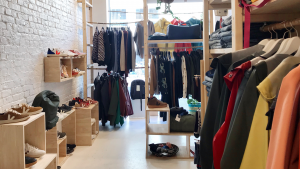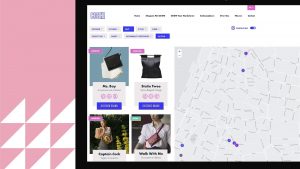
For ethical clothing
For many years now, there has been a great deal of information about the negative impact of our consumption patterns on human rights and the

For many years now, there has been a great deal of information about the negative impact of our consumption patterns on human rights and the

For many years now, we’ve known that the way we consume has negative consequences on both people and planet. The 2013 Rana Plaza collapse, which killed more than 1,100 people working for major clothing brands, shone a light on the appalling working conditions in sweatshops. On 27 September 2022, Enabel’s TDC hosted a conference on ethical clothing, followed by a fashion show. The event was attended by more than 150 people. The debates focused on two key questions: Have working conditions in the textile industry improved since the collapse of Rana Plaza? And is Made in Europe a guarantee of decent work?

When shopping, don’t focus on what’s in fashion, but look for your own style that suits you. Tonny van Bavel Tweet In 2012, Mechelen couple

Welcome to the Harvest Club, in the heart of Leuven. Stefanie Vereecken selects a wide range of clothing, home décor, accessories and beauty and care products for her sociable concept store. All from suppliers with their heart in the right place, just like Stefanie. Want to take a look inside?

Kalani’s household linen is both organic and fair trade. It is one of the few textile brands in the world that knows exactly where the cotton for its household linen comes from. Founder Bruno Van Steenberghe talks about his commitment to farmers in India, about his concern for the environment, and the health of his customers.

After two and half years of selling clothes via private sales and at fair trade shows, at the end of 2019 Sophie Depas and Esther Sougné opened the L’envol du colibri boutique in Namur. They support the idea of ethical and sustainable fashion, through brands for both women and men. An interview with the two ladies.

“Our shirts should catch the eye of the buyer first and foremost because they are stylish and high quality. In doing so they prove this goes hand in hand with fairness and sustainability.” These are the words of An Boone, founder of the Belgian fair fashion brand Mr. Manchette. With her sustainable men’s shirts she fills a gap in both conventional clothing and fair fashion shops.

As the European Commission is poised to start developing a new ‘comprehensive strategy for textiles’ in the coming months, a group of 65 diverse civil society organisations has set out its vision for the global Textile, Garments, Leather and Footwear (TGLF) sector. They have done so by releasing a non-official (or “shadow”) strategy in which they propose a set of legislative and non-legislative actions that the EU can undertake to contribute to fairer and more sustainable TGLF value chains.

Niki De Schryver found that many people want to buy sustainable clothing but don’t know how. That’s why she launched COSH!

From fair trade coffee to fair fashion For many years the Fair Trade Towns campaign has shown that local authorities can play an important role

For many years now, there has been a great deal of information about the negative impact of our consumption patterns on human rights and the

For many years now, we’ve known that the way we consume has negative consequences on both people and planet. The 2013 Rana Plaza collapse, which killed more than 1,100 people working for major clothing brands, shone a light on the appalling working conditions in sweatshops. On 27 September 2022, Enabel’s TDC hosted a conference on ethical clothing, followed by a fashion show. The event was attended by more than 150 people. The debates focused on two key questions: Have working conditions in the textile industry improved since the collapse of Rana Plaza? And is Made in Europe a guarantee of decent work?

When shopping, don’t focus on what’s in fashion, but look for your own style that suits you. Tonny van Bavel Tweet In 2012, Mechelen couple

Welcome to the Harvest Club, in the heart of Leuven. Stefanie Vereecken selects a wide range of clothing, home décor, accessories and beauty and care products for her sociable concept store. All from suppliers with their heart in the right place, just like Stefanie. Want to take a look inside?

Kalani’s household linen is both organic and fair trade. It is one of the few textile brands in the world that knows exactly where the cotton for its household linen comes from. Founder Bruno Van Steenberghe talks about his commitment to farmers in India, about his concern for the environment, and the health of his customers.

After two and half years of selling clothes via private sales and at fair trade shows, at the end of 2019 Sophie Depas and Esther Sougné opened the L’envol du colibri boutique in Namur. They support the idea of ethical and sustainable fashion, through brands for both women and men. An interview with the two ladies.

“Our shirts should catch the eye of the buyer first and foremost because they are stylish and high quality. In doing so they prove this goes hand in hand with fairness and sustainability.” These are the words of An Boone, founder of the Belgian fair fashion brand Mr. Manchette. With her sustainable men’s shirts she fills a gap in both conventional clothing and fair fashion shops.

As the European Commission is poised to start developing a new ‘comprehensive strategy for textiles’ in the coming months, a group of 65 diverse civil society organisations has set out its vision for the global Textile, Garments, Leather and Footwear (TGLF) sector. They have done so by releasing a non-official (or “shadow”) strategy in which they propose a set of legislative and non-legislative actions that the EU can undertake to contribute to fairer and more sustainable TGLF value chains.

Niki De Schryver found that many people want to buy sustainable clothing but don’t know how. That’s why she launched COSH!

From fair trade coffee to fair fashion For many years the Fair Trade Towns campaign has shown that local authorities can play an important role